
The Pacific Star is a military campaign medal instituted by the United Kingdom in May 1945 for award to British and Commonwealth forces who served in the Pacific Campaign from 1941 to 1945, during the Second World War.
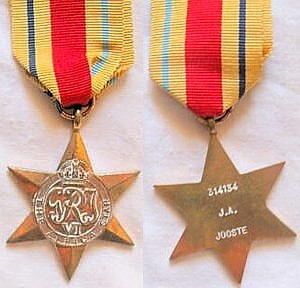
The Africa Star is a military campaign medal, instituted by the United Kingdom on 8 July 1943 for award to British and Commonwealth forces who served in North Africa between 10 June 1940 and 12 May 1943 during the Second World War.

The Africa Service Medal is a South African campaign medal for service during the Second World War, awarded to members of the Union Defence Forces, the South African Police and the South African Railways Police. The medal was originally intended for service in Africa, but it was later extended to cover service anywhere in the world.
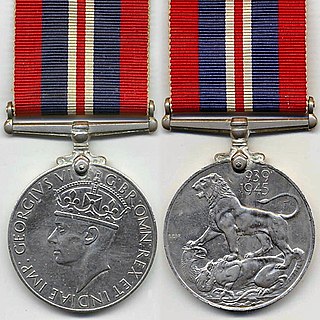
The War Medal 1939–1945 is a campaign medal which was instituted by the United Kingdom on 16 August 1945, for award to citizens of the British Commonwealth who had served full-time in the Armed Forces or the Merchant Navy for at least 28 days between 3 September 1939 and 2 September 1945.
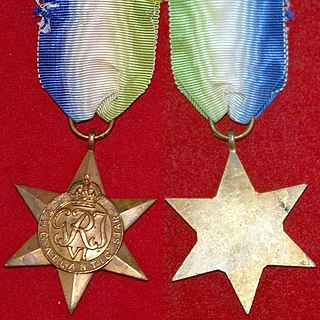
The Atlantic Star is a military campaign medal, instituted by the United Kingdom in May 1945 for award to British Commonwealth forces who took part in the Battle of the Atlantic, the longest continuous campaign of the Second World War.

The 1939–1945 Star is a military campaign medal instituted by the United Kingdom on 8 July 1943 for award to British and Commonwealth forces for service in the Second World War. Two clasps were instituted to be worn on the medal ribbon, Battle of Britain and Bomber Command.

The Air Crew Europe Star is a military campaign medal, instituted by the United Kingdom in May 1945 for award to British and Commonwealth air crews who participated in operational flights over Europe from bases in the United Kingdom during the Second World War.

The Burma Star is a military campaign medal, instituted by the United Kingdom in May 1945 for award to British and Commonwealth forces who served in the Burma Campaign from 1941 to 1945, during the Second World War.
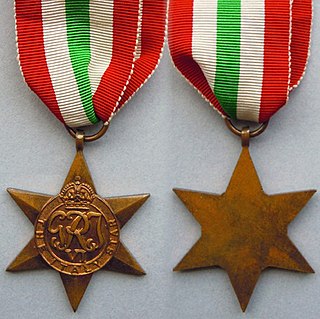
The Italy Star is a military campaign medal, instituted by the United Kingdom in May 1945 for award to British Commonwealth forces who served in the Italian Campaign from 1943 to 1945, during the Second World War.

The France and Germany Star is a military campaign medal, instituted by the United Kingdom in May 1945 for award to British Commonwealth forces who served in France, Belgium, Luxembourg, the Netherlands or Germany and adjacent sea areas between 6 June 1944 and 8 May 1945, during the Second World War.

The Malaysian Service Medal is a medal given by the King and Government of Malaysia. Established 3 March 2004, the medal recognizes service by members of the Malaysian Armed Forces during the Malayan Emergency, Second Malayan Emergency, and the Indonesia–Malaysia confrontation. The medal was also offered for award to members of the Commonwealth forces from Australia, Fiji, India, Nepal, New Zealand, and the United Kingdom who served in Malaysia during the Malayan Emergency and the Indonesia–Malaysia confrontation. The award is in recognition of "distinguished chivalry, gallantry, sacrifice, or loyalty" in contributing to the freedom of independence of Malaysia. The medal can be conferred and accepted posthumously by next of kin.

The Defence Medal is a campaign medal instituted by the United Kingdom in May 1945, to be awarded to citizens of the British Commonwealth for both non-operational military and certain types of civilian war service during the Second World War.
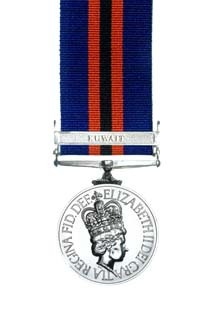
The New Zealand General Service Medal 1992 (Warlike) is a New Zealand campaign medal, authorised in 1992, for award to New Zealanders who have served in warlike operations for which no separate New Zealand or British Commonwealth campaign medal was issued.

The Operational Service Medal for Afghanistan is a campaign medal previously awarded by the Ministry of Defence of the United Kingdom for service by British Armed Forces personnel in support of the post-2001 Afghan War.

The Operational Service Medal for the Democratic Republic of the Congo is a British armed forces campaign medal, awarded mostly to military personnel who served between 14 June and 10 September 2003 on Operation Coral.

The General Service Medal, is a campaign medal of the United Kingdom introduced in 1962 to replace both the General Service Medal (1918), as awarded to the Army and RAF, and the Naval General Service Medal (1915). The 1962 GSM was awarded until 2007, when it was replaced by the Operational Service Medal. In 2015 the General Service Medal (2008) was introduced.

The Australian Active Service Medal 1945–1975 recognises the service of Australian Defence Force and certain other persons in prescribed warlike operations in the period after World War II, and prior to February 1975. The medal was established in December 1997. The Australian Active Service Medal recognises warlike service after February 1975 until 2012 when the Australian Operational Service Medal was instituted.
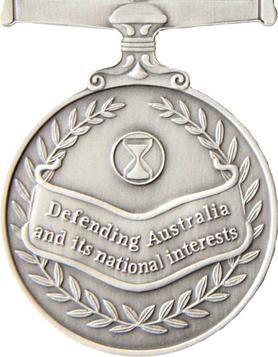
The Australian Operational Service Medal is a campaign medal established on 22 May 2012 to recognise service by Australian Defence Force (ADF) personnel on designated hazardous operations. It may also be awarded to civilians who serve alongside the ADF on designated operations under specific conditions.

The Arctic Star is a military campaign medal instituted by the United Kingdom on 19 December 2012 for award to British Commonwealth forces who served on the Arctic Convoys north of the Arctic Circle, during the Second World War.

The Operational Service Medal Iraq and Syria or Operation Shader Medal is a British armed forces campaign medal, awarded mostly to military personnel who served in the operational area of, or in support of Operation Shader. The medal was first announced by former Defence Secretary, Sir Michael Fallon on 19 September 2017. It was first awarded, to service personnel, on 18 July 2018 in London by Defence Secretary Gavin Williamson. This Operational Service Medal is the first medal of the contemporary era to be awarded to individuals who served outside of the operational area, reflecting the changing nature of warfare.





















